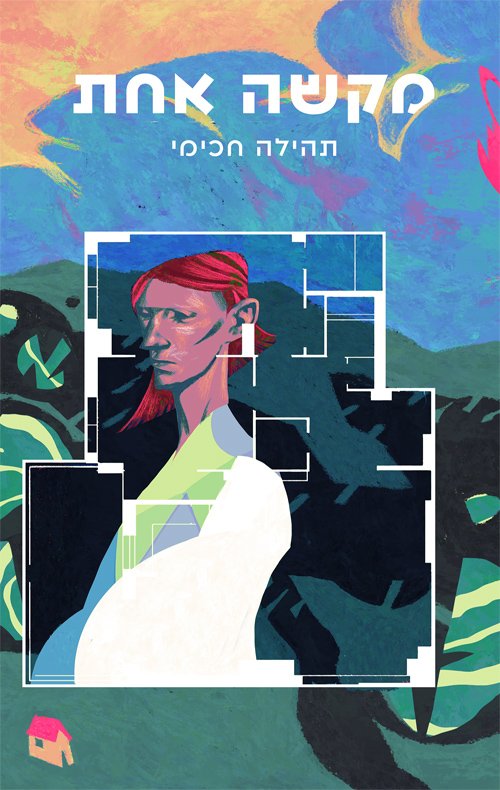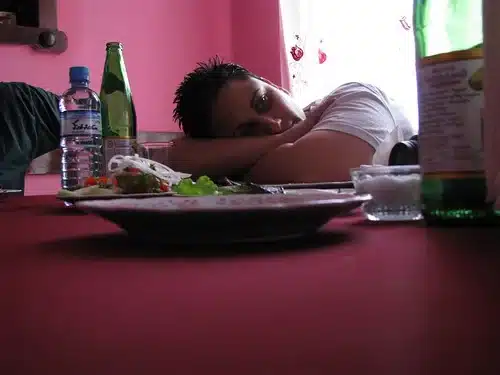"מקשה אחת" היא אחת מארבע נובלות במייזם פוסטקפ של מכון וון ליר. על המייזם המעניין ניתן לקרוא בקישור הבא: קליק.
פוסט- קפיטליזם כשמו כן הוא: הסדר כלכלי הנגזר מקפיטליזם. המייחד את הסדר זה הם שני תהליכים שצירופם מוביל להסדר חברתי כלכלי שוויוני וצודק יותר:
התהליך הראשון הוא האצה טכנולוגית המובילה ליתירות העבודה האנושית. תהליך זה מוביל בהכרח להרחבת שעות הפנאי של האדם וגידול תוחלת החיים שלו.
התהליך השני כרוך במשברי אקלים ואסונות אקולוגיים שחייבו את בני האדם להגירה והתארגנויות במבנים חברתיים חדשים הגוברים על ההסדרים לאומיים ומדינתיים וכן על הסדרים של קניין ובעלות פרטית. ביטול ההסדרים הקיימים, הלאמת המשאבים הסביבתיים והמשאבים שבבעלות פרטית בידי ישויות "על" מאפשרים מחד פרנסה לכלל החברים בקבוצה, מאידך הם מתחשבים בסביבה ובמגבלות ניצול המשאבים של כדור הארץ.
"מקשה אחת" עוסקת בהיבט השני של התהליכים המובילים לפוסט-קפיטליזם.
יורם, מגדל אבטיחים ובעל קרקעות בבעלות פרטית במושב הסמוך למה שהיה פעם קו הגבול הצפוני של ישראל, נפטר במפתיע. המוות מתרחש יום לפני אזכרת בתו הבכורה אלונה שנהרגה בתאונת דרכים.
בשבעה מתכנסים בני המשפחה: אלינור האלמנה, נוגה וגלי ילדיו של יורם ולונא, בתה של נוגה ונכדתו שלו יורם.
התכנסות זו מציפה מתחים וזיכרונות בן בני המשפחה. המתחים הם בעיקר על רקע ההסדר הפוסט – קפיטליסטי, אבל לא רק. הם נובעים גם מהדינמיקה שנוצרה בן בני המשפחה לאחר שאלונה נהרגה.
בעקבות כוונת הממשל השיתופי להפוך את האזור למתחם חקלאות שיתופית, בני המשפחה מתחבטים בשאלת מקשת האבטיחים שברשותם. המשפחה מודעת ליתרונות בהעברת הבעלות לממשל השיתופי שכן בעלי קרקעות פרטיות צפויים לשלם מיסים גבוהים. ברם, לאדמות יש ערך רגשי עצום עבור יורם ודבר זה חוצה את המשפחה לשתיים:
יורם שמתנגד להלאמת האדמות אותן ירש מהוריו ומולו בנו, גלי, שתומך באידיאולוגיה השיתופית.
לאחר מותו של יורם הפער בין הצדדים מתחדד כאשר בני המשפחה הנותרים נחלקים בדעותיהם בין יורם לבנו.
המחלוקת על הבעלות הפרטית, למעשה יושבת על שאלת הנאמנויות ותחושות הניכור מהמבנה המשפחתי המוכר. לאחר מותה של אלונה, המשפחה התפרקה. גלי מצא נחמה בתנועה החדשה לעומת אימו ואחותו שרואות באדמה את זיכרה של אלונה.
בעולם שבו ניתן להקים תא משפחתי קולקטיבי, אין משמעות למשפחה הגרעינית והנאמנויות עוברות ל"משפחה" האלטרנטיבית.
הסופרת מדגימה את שאלת הנאמנות למשפחה הגרעינית גם דרך הסיפור של לונא, שמתכננת להקים תא משפחתי קולקטיבי עם שלושת שותפיה לדירה בבאר שבע. מודל המשפחה הקולקטיבית הוא תחליף למשפחה הגרעינית ולונא שמחה להחליף את המודל הישן לנוכח הניסיון שיש לה ממערכת היחסים העכורה שלה עם אמה – נוגה.
אבל כאשר לונא מגלה שהיא בהריון לא מתוכנן, האמונות שלה בדבר ההורות הקולטיבית מתערערות. היא שומרת את ההריון בסוד, וככל שהשבעה מתקדמת אל סיומה, ניכר שהיא מחשבת מסלול מחדש, וגם ניכרת מאיסות שלה בחבריה לקולקטיב.
למרות שהיו לי צפיות מהנובלה הזו, הרגשתי שאין מספיק פיתוח הרעיונות שעומדים בבסיס העולם הפוסט- קפיטליסטי. ישנה התפזרות לרעיונות ואף אחד מהם לא מתגבש לאמירה משמעותית. כך, אומנם הנובלה מתמקדת במחלוקת שבין יורם לגלי אבל זה רק במישור ההצהרתי של העיניין ואין פיתוח של המודל החלופי למודל הבעלות הפרטית.
הקורא אינו לומד על האסון האקולוגי שחייב מעבר לצורת ממשל שיתופי, הוא לא לומד על ההכרח לעבור לצורת ממשל פוסט- לאומית ופוסט-לאומנית, פשיטא מכאן גם לא ברורת ההשלכות של המעבר לשיטת ממשל זו על הפרט (למעט שאלת הלאמת הקניין הפרטי). בנוסף, ברור שצורת השילטון החדשה חייבה פירוק של מדינת ישראל, אולם הסופרת לא מפתחת את הנתיב הזה ולא ברורות השלכות הפירוק על הפרט.
יתכן שהצמצום במידע נובע מקושי אובייקטיבי, שכן הסופרת נדרשה לכתוב נובלה. ברם, הסופרת האריכה מידי לטעמי במלל שנקשר למערכת היחסים שבין נוגה ללונא והרחיבה בחלקים שבהם לונא כותבת קטעי יומן שלא ברורה תכליתם.
סה"כ קריאה מעניינת, הרעיונות שבבסיס הנובלה מעניינים, אבל מאחר והסופרת כל כך התאמצה להותיר את הנובלה במישור המשפחתי ואת החיכוך מצומצם לכאן ועכשיו של בני המשפחה, היא נעדרת את המימד הדיסאוטופי ובשלב מסויים התיאור של חיי הגיבורים הופך בנאלי.
מקשה אחת/ תהילה חכימי
הוצאת פרדס, 2023, 134 עמ'
דירוג SIVI –
איכות אודיו –

פוסטקפ #
לדף הסידרה –
"Motherland" is one of four novellas in the Van Leer Institute's Postcap project. You can read about the interesting project at the following link: click.
Post-capitalism is a socioeconomic system that follows capitalism. It differs from capitalism due to two processes that create a fairer economic and social arrangement:
The first process is the acceleration of technology, resulting in the redundancy of human labor. This inevitably leads to an increase in leisure time and life expectancy.
The second process involves the repercussions of climate crises and ecological disasters that have forced humans to migrate and organize in new social structures, which override national and state arrangements, as well as property and private ownership arrangements. The cancellation of existing arrangements, nationalization of environmental resources, and resources that are privately owned by "super" entities enable a livelihood for all members of the group while also taking into account the environment and the limitations of utilizing the earth's resources.
"Motherland" explores the second stage in the series of events that ultimately lead to a post-capitalist society.
Yoram, a watermelon grower and the owner of privately owned land in a Moshav near what was once Israel's northern border, passed away suddenly. His death happened one day before the memorial of his eldest daughter, Alona, who died in a car accident.
During the Shiva, the family comes together to mourn Yoram's passing. Among the attendees are Elinor, Yoram's widow; Noga and Gali, his children; and Luna, his granddaughter, and Noga's daughter.
This gathering is filled with tension and memories of family members. The tension is mainly due to the post-capitalist arrangement, but not only. It also stems from the dynamics that were created between the family members after Alona was killed.
The cooperative government intends to transform the area into a cooperative farming complex. However, the family members are unsure what to do with the watermelons they possess. They know that transferring ownership to the cooperative government would be beneficial as private landowners are expected to pay high taxes. But Yoram had an emotional attachment to the land, causing the family to be divided on what to do next.
Yoram inherited land from his parents but opposed its nationalization. His son Gali, on the other hand, supports cooperative ideology.
After Yoram's passing, the divide between family members deepens as they hold different opinions about Yoram and his son.
The conflict surrounding private ownership essentially boils down to the issue of loyalties and emotions of estrangement from the customary family setup. Following Alona's demise, the family disintegrated. While Gali discovered comfort in a new movement, his mother and sister still hold the memory of Alona in their hearts.
In a world where loyalty shifts to an alternative "family" unit, the nuclear family loses meaning.
The author portrays the theme of loyalty to the nuclear family through the character of Luna in the story. Luna chooses to create a collective family unit with her three roommates in Beer Sheva as an alternative to the traditional nuclear family. Luna is satisfied with the new family model as her previous relationship with her mother, Noga, was complicated.
Luna had always believed in collective parenting until she found out that she was unexpectedly pregnant. This revelation shook her beliefs, and she decided to keep it a secret. As the Shiva progressed, it became apparent that Luna was reconsidering her decision and that she missed her fellow members of the collective.
Although I had some thoughts about the novella, I felt that the ideas behind the post-capitalist world were not fully developed. There were some scattered ideas, but none of them formed a clear and meaningful statement. Although the novella focuses on the argument between Yoram and Gali, it only presents the object on a declarative level, without developing an alternative model to the model of private ownership.
The book does not cover the ecological disaster that made it necessary to transition to a cooperative form of government. The book also does not explain the need for a move to a post-national and post-nationalist form of government. Therefore, the impact of this transition on the individual is not clear, except for the question of nationalization of private property. Furthermore, the book suggests that the new form of government would require the dissolution of the State of Israel, but the author doesn't elaborate on this path, and the consequences of such dissolution on the individual are not clear.
It's possible that the reduction in information is due to an objective difficulty, given that the author was required to write a novella. However, in my opinion, the author focused too much on the relationship between VenusNoga and Luna and extended this part excessively. Additionally, the author expanded on the sections where Luna writes diary entries, which doesn't seem to serve a clear purpose.
לגלות עוד מהאתר Sivi's Books
Subscribe to get the latest posts sent to your email.

